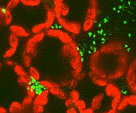Plant Pathology, Department of

Department of Plant Pathology: Faculty Publications
Document Type
Article
Date of this Version
2012
Citation
Plant Disease Management Reports 6, FC016 (2012).
Abstract
foliar fungicide efficacy timing trial was conducted at the University of Nebraska-Lincoln South Central Agricultural Laboratory near Clay Center, NE. Dekalb corn hybrid DKC 62-54, rating of “good” (6 out of 9) for gray leaf spot (GLS) and “excellent” (2 out of 9) for common rust (CR), was planted on 3 May in 30-in. rows with a target population of 32,000 plants/A. The trial area was disked with soybean as the previous year’s crop. On 9 May before plant emergence, a herbicide program of Roundup (1 pt/A), Verdict (16 fl oz/A) and Atrazine (1 lb/A) was applied to the trial site. Seven treatments and a non-treated control were replicated six times in a randomized complete block design. . . . Common smut, Physoderma brown spot, and southern rust occurred at very low severity levels and their severity was not assessed. The AUDPC calculations indicated all fungicide treatments at any application timing reduced GLS and CR severity compared to the non-treated control. Stay green percentages ranged from 21.6% for Headline AMP 1.67, 10 fl oz/A, V5 to 29.5% for Stratego YLD 4.18 SC, 2 fl oz/A, V5 fb 4 fl oz/A, R1. 500-count kernel weights ranged from 6.15 oz (Quilt Xcel 2.2 SE, 10.5 fl oz/A, V5) to 6.29 oz (non treated-control and Headline AMP 1.67 SC, 10 fl oz/A, V5). Stratego YLD 4.18 SC, 2 fl oz/A, V5 fb 4 fl oz/A, R1 had the highest grain moisture at harvest (15.2%) There were significant differences in yield treatments. Stratego YLD 4.18 SC, 2 fl oz/A, V5 fb 4 fl oz/A, R1 was the highest yielding treatment with 253.1 bu/A.


Comments
Copyright © 2012 The American Phytopathological Society. Used by permission.